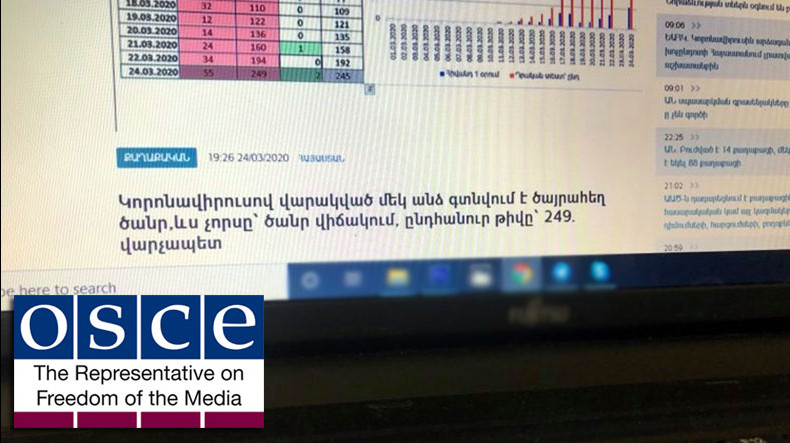
OSCE: Сoronavirus response should not impede the work of the media in Armenia
The OSCE Representative on Freedom of the Media, Harlem Désir, expressed his concerns on Tuesday about a package of amendments to the criminal and administrative codes, introduced in Armenia on 23 March, in the context of the fight against disinformation related to the COVID-19 pandemic, the OSCE said in a statement.
During the current state of emergency in Armenia, any “organization that carries out journalistic activities” (the term includes electronic publications that are not considered part of the legacy media) would only be allowed to publish information about the coronavirus crisis that has been released by official sources. The government explains that this is necessary to avoid any aggression towards coronavirus patients or panic among the population. Journalists and editors have criticized this decision, stating that there is no precise definition of which messages may or may not cause panic.
“I fully understand the aim of the new law to avoid panic, aggression and to combat false information during the COVID-19 pandemic,” Désir said. “At the same time, the media has a crucial role to play in providing important information to the public and to counter ‘fake news’ on the pandemic,” the Representative added. “The law should not impede the work of journalists and their ability to report on the pandemic. Publishing only information provided by the authorities is a very restrictive measure which would limit freedom of the media and access to information disproportionately.”
The maximum fine for publications considered to have violated the restrictions during a state of emergency was stated at 300,000 drams (approximately $600). A refusal to delete prohibited information within 24 hours will result in a fine of 500-1000 times the minimum wage ($1,000-2,000).
Harlem Désir recalled the joint statement that he published last week with David Kaye, UN Special Rapporteur on the promotion and protection of the right to freedom of opinion and expression, and Edison Lanza, IACHR Special Rapporteur for Freedom of Expression, which emphasized that: "Human health depends not only on readily accessible health care. It also depends on access to accurate information about the nature of the threats and the means to protect oneself, one’s family, and one’s community.”
Related news
Newsfeed
Videos






























